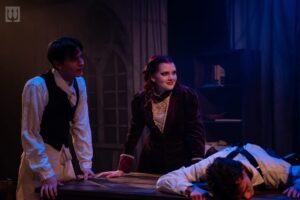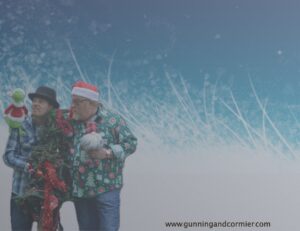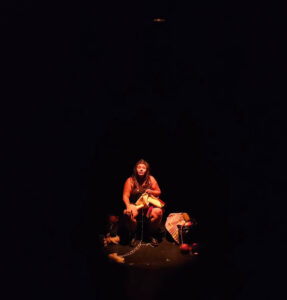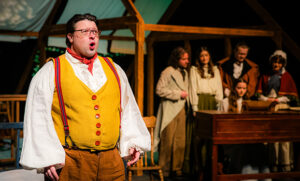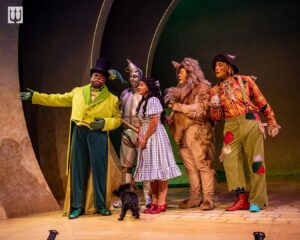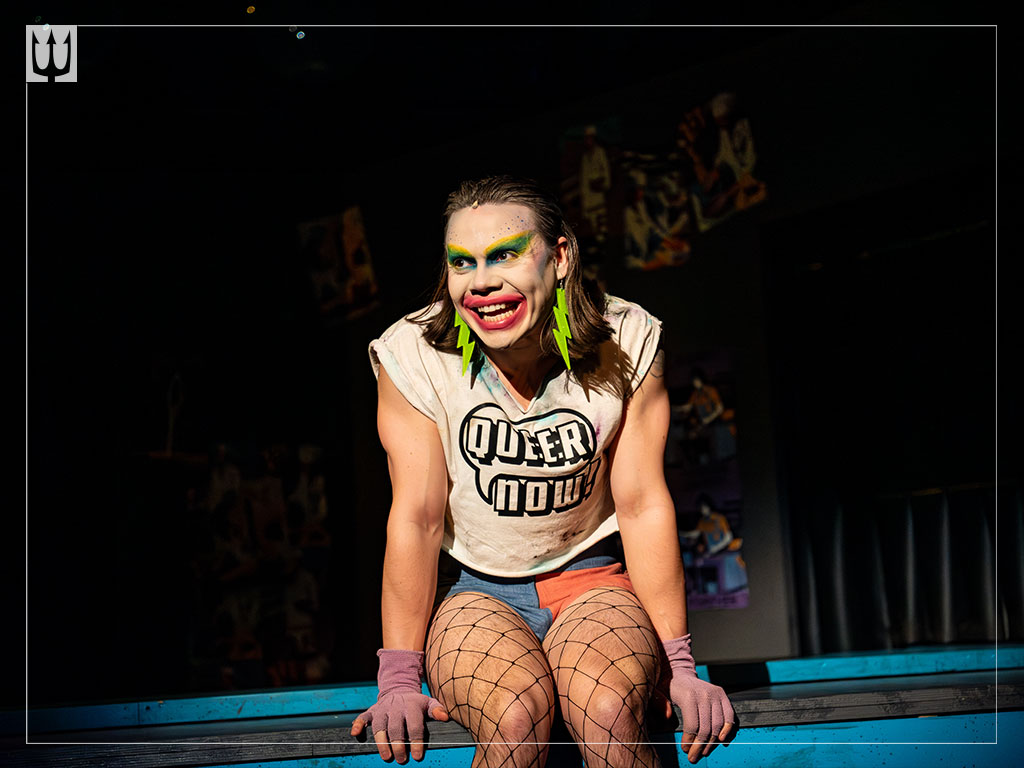
Wayne Burns as Ayo. Photo by Stoo Metz.
Breton Lalama is perhaps best known to Halifax audiences for playing Riff Raff in Neptune Theatre’s 2022 production of The Rocky Horror Show. Although he started writing his play, The Last Show on Earth™️, seven years ago, when he was first coming out as trans, it feels very much like a play incubated during a global pandemic. In fact, I felt like Lalama had put Rocky Horror and the Queer joy surrounding that experience, the entire experience of Covid, his coming out as trans, our perpetual fears about climate change, along with the genres of drag and burlesque into a blender and mixed it all together, and the result was this show: what Lalama refers to aptly as a “sexy little fever dream.”
In a world that is counting down to the known moment of the apocalypse, Eli, played by Elm Reyes, has started work at a new job at the famed Jorday Fruit Roll-Up Factory. They are hoping to save up enough money to secure a Fleedom ticket, which will shuttle them safely to a new human colony on Mars. Unfortunately, space in space is extremely limited, and the Fleedom ticket prices are being inflated by the millisecond. At the same time Ayo, played by Wayne Burns, is hosting what seems to be a nearly constant livestream count down for life on Earth, and they are preparing to host The Last Show on Earth™️, which is exactly as it sounds, literally the last show to ever be performed on Earth. Ayo finds meaning and purpose, and excitement in being part of this historical moment, even if they will never get to live in its shadow. Eli, however, is struggling to figure out how to fill his days, feeling like, as a young person, he was just starting his life, and that through the lens of the End of the World it all seems like a waste. Eli is being either stalked or haunted by Ayo, his former friend, whose face and voice emanates from everywhere: the screens all around live-streaming, the show posters on the walls, and right there in the factory with him, although the audience gets to decide whether these interactions are real life, or whether they are vivid manifestations of Eli’s anxious imagination. Eli forms a real-life bond with his boss, Lina, 8th Generation Fruit Roll-Up Heiress, played by Anne-Marie Saheb, but Ayo keeps trying to convince Eli that ending the world with one person is boring and ordinary, and that he should join them onstage for the party of a lifetime. Eli is torn between his desire to be in front of an adoring crowd, and his desire to make a meaningful, more intimate connection.
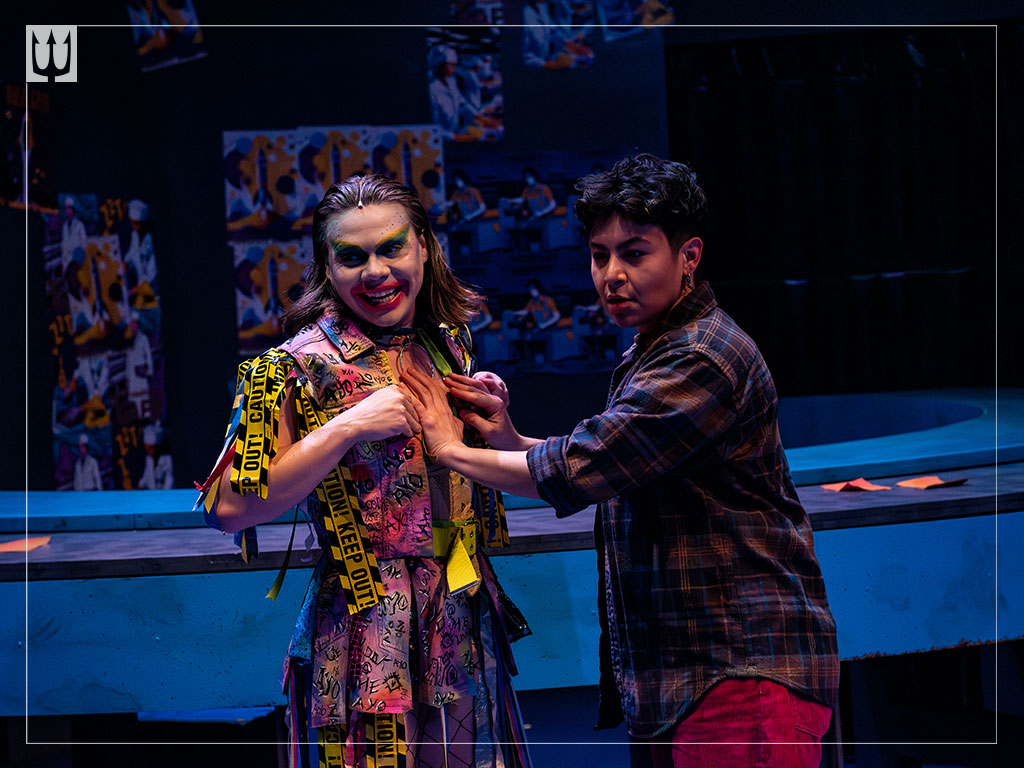
Both Elm Reyes’ Eli and Anne Marie Saheb’s Lina are barely functioning their anxiety levels are so high, which feels appropriate given every second they are feeling the weight of their time to be alive slipping away from them. Eli is terrified of death, and is still grappling with how unfair it is to be alive for this part of history, and to be abandoned by richer former friends and neighbours, who were able to fly off to safety. Lina is throwing herself into horoscopes and wine and keeps trying to convince herself she has made the right decision to stay. Both these performances feel really grounded in reality, even when Eli drifts into a reverie; it feels true to how someone might behave alone at work with really nothing left to lose.
Wayne Burns’ Ayo, kind of a Michael Alig for the Apocalypse, is absolutely irreverent. They have distanced themselves so far from the reality of the situation, also a coping mechanism, that they can make gallows humour jokes in their sing-song vocal fry voice all day, and convince us that all they are concerned about is whether everyone is watching them and whether they will herald in the End alone, or if Eli will be by their side. We never know whether the latter actually matters to Ayo, or whether Eli is projecting that onto them. After all, in every other respect Ayo is completely self-absorbed. Is it really plausible that they would want to share the spotlight with anyone during their big night?
The costumes by Oliver Dorais-Fleming really capture the essential differences between the three characters. Eli is dressed quite casually, in a plaid shirt over a t-shirt, but with sort of jaunty red slacks. Lina is dressed more professionally, as even though nothing matters anymore, she still take the time to care about the way she presents herself, and her company to the world. She is churning out Fruit Roll-Up commercials right until the end. Ayo has a myriad of different costume changes, and they are very Grunge 1980s Club Kid meets Frank N’ Furter in the dystopian nightmare. For Ayo everything is about presentation: the way their body is seen and admired, and consumed- it keeps them from having to have real thoughts and real feelings about the heaviest moment of all time.
Lalama’s storytelling, too, has Lina and Eli attempting to have normal conversations, but they are stilted and strange, like when we were all emerging from Covid lockdowns and no one knew how to socialize anymore. Ayo’s language is more poetic and intentionally leaves meaning up to interpretation. There is something ephemeral about Ayo, like they are always arguing both sides of the coin, because, like the Emcee in Cabaret, “they don’t care much either way.” They are there to make you consider what you might do if you only had three months to live, and whether you should be living that way regardless. What does it mean to have a meaningful life? What about a meaningful death? Should you run out and buy that jukebox you’ve always wanted?
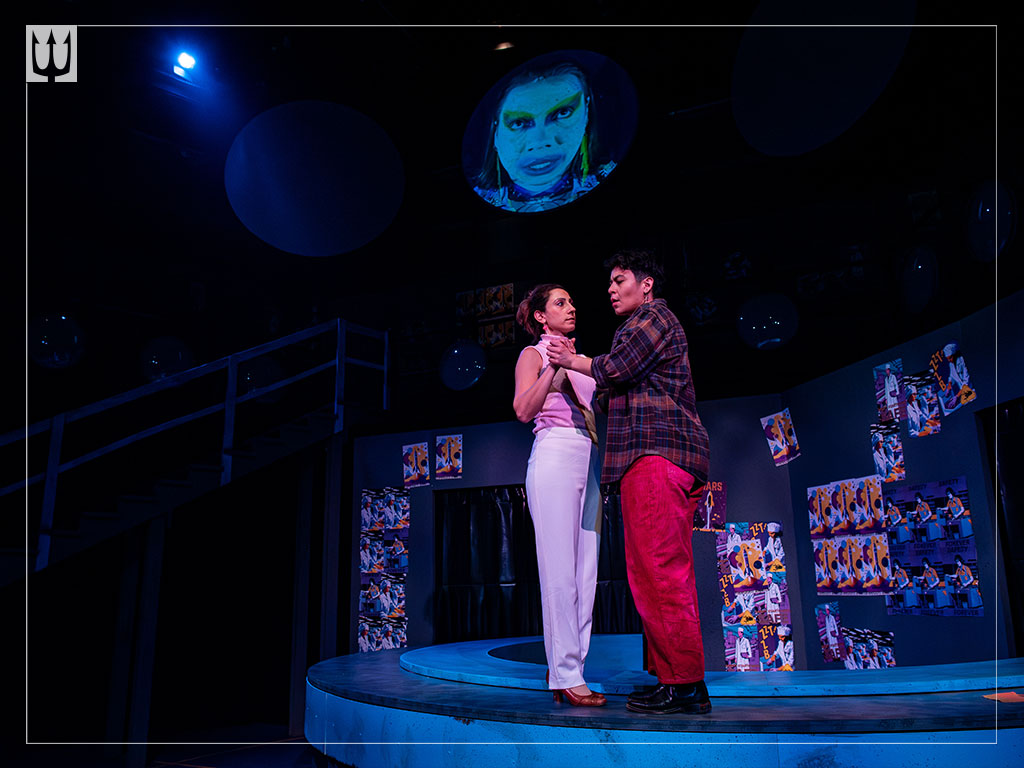
Annie Valentina directs the piece making excellent use of the factory’s conveyor belt, which takes up a large portion of the stage, and it continues offstage, so actors are able to both enter and exit on the belt, as well as the staircase that connects the stage with the catwalk. There is quite a bit of dancing and movement in this show, and all the actors have a beautiful- almost at times breathtaking- specificity of movement. My favourite moment of the show was when Lina surprises Eli, and he is so shocked, he is physically taken aback. Obviously Reyes is never surprised that Saheb is there, they have rehearsed and performed this moment dozens of times, if not more, but it is so realistic that the audience laughs with their own shock of it. The song “Till Then” by the Mills Brothers recurs throughout the show, which is such an interesting choice, watching these futuristic humans listening to a song from 1944.
“Till then, let’s dream of what there will be/ Till then, we’ll call on each memory/ Till then, when I will hold you again/ Please wait till then.”
The tension between the singers of the song dreaming of a future meeting with their love, and Eli and Lina who literally have no future reminds me of Wall-E, alone, listening to “Put On Your Sunday Clothes.” That scene always makes me cry in a way that is also frightened.
There is a line that Billy Boyd’s Guildenstern has in Rosencrantz and Guildenstern Are Dead next door where he says, “And then again, what is so terrible about death? As Socrates so philosophically put it, since we don’t know what death is, it is illogical to fear it. It might be… very nice,” which gets a big laugh from the audience. Lina says something similar to Eli in this play, although in this instance there is a stronger sense of sincerity, and even a glimmer of hope. As bad as things seem now, in our reality, and as bad as they could possibly get, as in Lalama’s play, we never know what is beyond this world, so there is always the chance that we may be pleasantly surprised.
Annie Valentina directs the World Premiere of Breton Lalama’s The LAST SHOW ON EARTH ™, which closes tomorrow, February 18th, 2024 at Neptune Theatre’s Scotiabank Studio Theatre (1589 Argyle Street, Halifax). There is just one show tomorrow- at 2:00pm. Tickets range in price from $23.00 to $40.00 based on seating. For tickets please visit this website, call the Box Office at 902.429.7070, or visit in person at 1589-93 Argyle Street.
This show is estimated at 75 minutes (no intermission).
Babes in arms & children under 4 are not permitted in the theatre.
Please note: this show contains transphobia, homophobia, racism, suicide, strobe lights, theatrical haze, and simulated sex.

